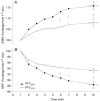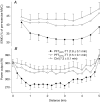Locomotor muscle fatigue modifies central motor drive in healthy humans and imposes a limitation to exercise performance
- PMID: 17962334
- PMCID: PMC2375542
- DOI: 10.1113/jphysiol.2007.141838
Locomotor muscle fatigue modifies central motor drive in healthy humans and imposes a limitation to exercise performance
Abstract
We asked whether the central effects of fatiguing locomotor muscle fatigue exert an inhibitory influence on central motor drive to regulate the total degree of peripheral fatigue development. Eight cyclists performed constant-workload prefatigue trials (a) to exhaustion (83% of peak power output (W(peak)), 10 +/- 1 min; PFT(83%)), and (b) for an identical duration but at 67% W(peak) (PFT(67%)). Exercise-induced peripheral quadriceps fatigue was assessed via changes in potentiated quadriceps twitch force (DeltaQ(tw,pot)) from pre- to post-exercise in response to supra-maximal femoral nerve stimulation (DeltaQ(tw,pot)). On different days, each subject randomly performed three 5 km time trials (TTs). First, subjects repeated PFT(83%) and the TT was started 4 min later with a known level of pre-existing locomotor muscle fatigue (DeltaQ(tw,pot) -36%) (PFT(83%)-TT). Second, subjects repeated PFT(67%) and the TT was started 4 min later with a known level of pre-existing locomotor muscle fatigue (DeltaQ(tw,pot) -20%) (PFT(67%)-TT). Finally, a control TT was performed without any pre-existing level of fatigue. Central neural drive during the three TTs was estimated via quadriceps EMG. Increases in pre-existing locomotor muscle fatigue from control TT to PFT(83%)-TT resulted in significant dose-dependent changes in central motor drive (-23%), power output (-14%), and performance time (+6%) during the TTs. However, the magnitude of locomotor muscle fatigue following various TTs was not different (DeltaQ(tw,pot) of -35 to -37%, P = 0.35). We suggest that feedback from fatiguing muscle plays an important role in the determination of central motor drive and force output, so that the development of peripheral muscle fatigue is confined to a certain level.
Figures







Comment in
-
Is peripheral locomotor muscle fatigue during endurance exercise a variable carefully regulated by a negative feedback system?J Physiol. 2008 Apr 1;586(7):2027-8; author reply 2029-30. doi: 10.1113/jphysiol.2008.152470. Epub 2008 Feb 14. J Physiol. 2008. PMID: 18276727 Free PMC article. No abstract available.
References
-
- Almeida TF, Roizenblatt S, Tufik S. Afferent pain pathways: a neuroanatomical review. Brain Res. 2004;1000:40–56. - PubMed
-
- Amann M, Pegelow DF, Jacques AJ, Dempsey JA. Inspiratory muscle work in acute hypoxia influences locomotor muscle fatigue and exercise performance of healthy humans. Am J Physiol Regul Integr Comp Physiol. 2007a;293:R2036–R2045. - PubMed
-
- Amann M, Romer LM, Pegelow DF, Jacques AJ, Hess CJ, Dempsey JA. Effects of arterial oxygen content on peripheral locomotor muscle fatigue. J Appl Physiol. 2006b;101:119–127. - PubMed
Publication types
MeSH terms
Grants and funding
LinkOut - more resources
Full Text Sources
Medical

